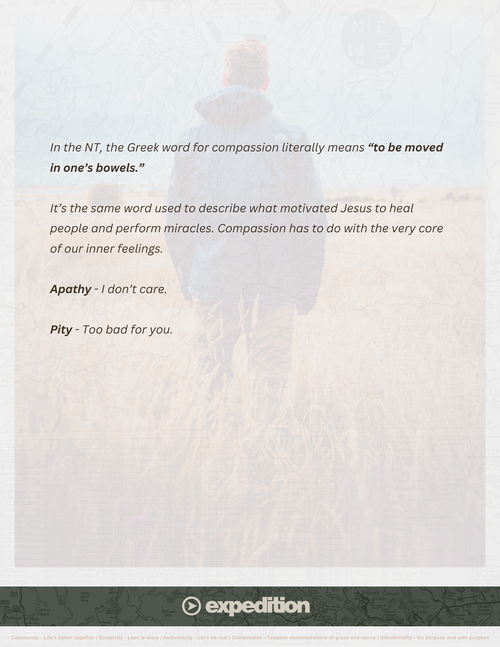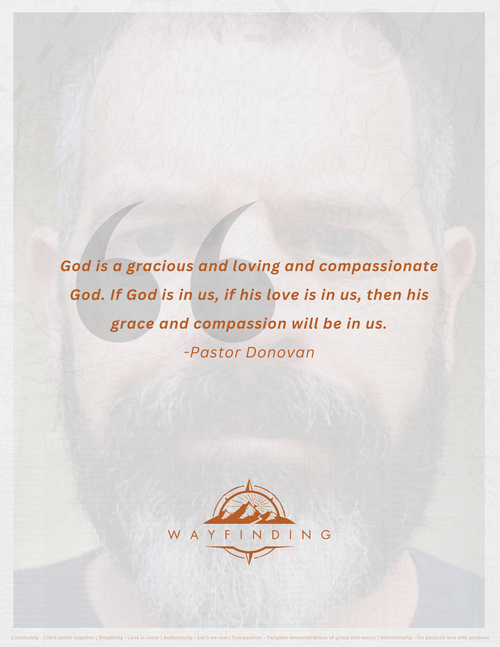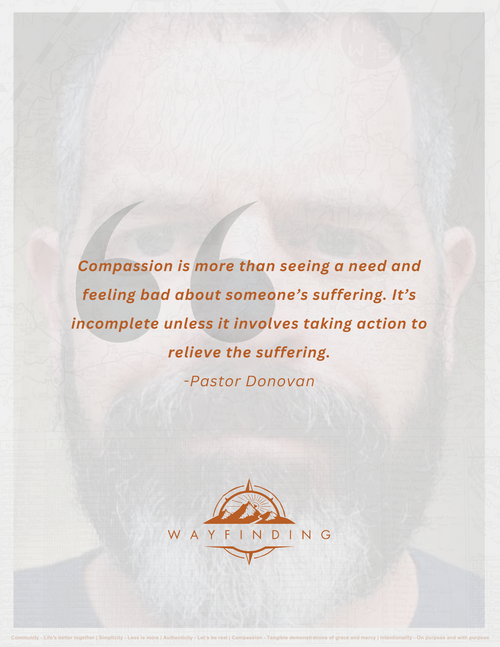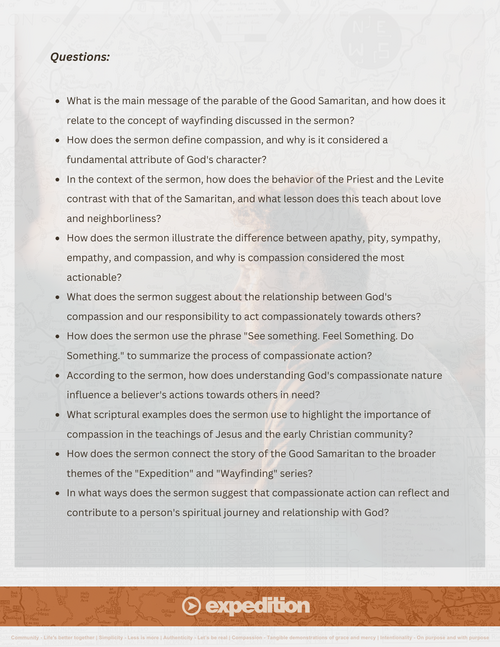Wayfinding Week 9

GOOD SAMARITAN
In one of Jesus’ most famous parables, he tells the story of a good Samaritan.
The context for the parable is that Jesus is trying to help a man understand what it means to love your neighbor.
So Jesus tells a story where a man who gets beat up and is left in a heap half dead on the side of the road. Two religious men, a Priest and a Levite walk by and do nothing. They ignore the man. A third man, the Samaritan, the least likely person to help the man stops to give aid.
Luke 10:33
… a Samaritan, as he journeyed, came to where he was, and when he saw him, he had compassion.
The Samaritan cared for him and took care of his needs. Then Jesus says, “go and do likewise.”
The parable fits perfectly with our wayfinding series.
Expedition- A journey undertaken by a group of people with a definite objective.
Wayfinding
How we choose to travel.
The parable of the Good Samaritan is a story about a man on a journey and how he acts on that journey. How we chooses to demonstrate love.
GOD IS A GOD OF COMPASSION
Ps. 103:8
The Lord gracious and compassionate.
These are fundamental attributes of God’s character. There is never a moment when he is not gracious, when he is not giving us undeserved favor.
He is never not compassionate.
In Latin, ‘compati’ means to “suffer with.” Compassion means someone else’s heartbreak becomes your heartbreak. Another’s suffering becomes your suffering.
Alexander Maclaren says it a “throb of pity” that shoots through us.
Mark 6:34
When he went ashore he saw a great crowd, and he had compassion on them, because they were like sheep without a shepherd.
In the NT, the Greek word for compassion literally means “to be moved in one’s bowels.”
It’s the same word used to describe what motivated Jesus to heal people and perform miracles. Compassion has to do with the very core of our inner feelings.
Apathy - I don’t care.
Pity - Too bad for you.
In one of Jesus’ most famous parables, he tells the story of a good Samaritan.
The context for the parable is that Jesus is trying to help a man understand what it means to love your neighbor.
So Jesus tells a story where a man who gets beat up and is left in a heap half dead on the side of the road. Two religious men, a Priest and a Levite walk by and do nothing. They ignore the man. A third man, the Samaritan, the least likely person to help the man stops to give aid.
Luke 10:33
… a Samaritan, as he journeyed, came to where he was, and when he saw him, he had compassion.
The Samaritan cared for him and took care of his needs. Then Jesus says, “go and do likewise.”
The parable fits perfectly with our wayfinding series.
Expedition- A journey undertaken by a group of people with a definite objective.
Wayfinding
- Set the course.
- Maintain the course.
- Reach the destination.
How we choose to travel.
The parable of the Good Samaritan is a story about a man on a journey and how he acts on that journey. How we chooses to demonstrate love.
GOD IS A GOD OF COMPASSION
Ps. 103:8
The Lord gracious and compassionate.
These are fundamental attributes of God’s character. There is never a moment when he is not gracious, when he is not giving us undeserved favor.
He is never not compassionate.
In Latin, ‘compati’ means to “suffer with.” Compassion means someone else’s heartbreak becomes your heartbreak. Another’s suffering becomes your suffering.
Alexander Maclaren says it a “throb of pity” that shoots through us.
Mark 6:34
When he went ashore he saw a great crowd, and he had compassion on them, because they were like sheep without a shepherd.
In the NT, the Greek word for compassion literally means “to be moved in one’s bowels.”
It’s the same word used to describe what motivated Jesus to heal people and perform miracles. Compassion has to do with the very core of our inner feelings.
Apathy - I don’t care.
Pity - Too bad for you.

James 2:15-16
15 If a brother or sister is poorly clothed and lacking in daily food, 16 and one of you says to them, “Go in peace, be warmed and filled,” without giving them the things needed for the body, what good is that?
Sympathy - I’m sorry for you.
Empathy - I’m sorry for you. I feel for you.
Compassion - I’m sorry for you. I feel for you. I’m going to do something about it.
Awareness. Affected. Action to alleviate it.
1 John 3:17
But if anyone has the world’s goods and sees his brother in need, yet closes his heart against him, how does God’s love abide in him?
God is a gracious and loving and compassionate God. If God is in us, if his love is in us, then his grace and compassion will be in us.
2 Corinthians 1:3–4
[3] Blessed be the God and Father of our Lord Jesus Christ, the Father of mercies and God of all comfort, [4] who comforts us in all our affliction, so that we may be able to comfort those who are in any affliction, with the comfort with which we ourselves are comforted by God.
Compassion is more than seeing a need and feeling bad about someone’s suffering. It’s incomplete unless it involves taking action to relieve the suffering.
15 If a brother or sister is poorly clothed and lacking in daily food, 16 and one of you says to them, “Go in peace, be warmed and filled,” without giving them the things needed for the body, what good is that?
Sympathy - I’m sorry for you.
Empathy - I’m sorry for you. I feel for you.
Compassion - I’m sorry for you. I feel for you. I’m going to do something about it.
Awareness. Affected. Action to alleviate it.
- Compassion includes seeing, feeling and doing.
- See something. Feel Something. Do Something.
- See. Feel. Do.
1 John 3:17
But if anyone has the world’s goods and sees his brother in need, yet closes his heart against him, how does God’s love abide in him?
God is a gracious and loving and compassionate God. If God is in us, if his love is in us, then his grace and compassion will be in us.
2 Corinthians 1:3–4
[3] Blessed be the God and Father of our Lord Jesus Christ, the Father of mercies and God of all comfort, [4] who comforts us in all our affliction, so that we may be able to comfort those who are in any affliction, with the comfort with which we ourselves are comforted by God.
Compassion is more than seeing a need and feeling bad about someone’s suffering. It’s incomplete unless it involves taking action to relieve the suffering.



Recent
Archive
2024
March
April
May
July
November
2023
December
Week 1- Circumstantial Peace DAY 1Week 1- Circumstantial Peace DAY 2Week 1- Circumstantial Peace DAY 3Week 1- Circumstantial Peace DAY 4Week 1- Circumstantial Peace DAY 5Week 2- The Peace Giver DAY 1Week 2- The Peace Giver DAY 2Week 2- The Peace Giver DAY 3Week 2- The Peace Giver DAY 4Week 2- The Peace Giver DAY 5Week 3 - Peace Givers DAY 1Week 3 - Peace Givers DAY 2Week 3 - Peace Givers DAY 3Week 3 - Peace Givers DAY 4Week 3 - Peace Givers DAY 5

No Comments